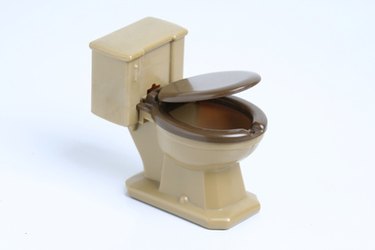
Composting toilets have been used in remote areas for decades, but their use by those wishing to live "green" is making them more commonplace. Composting toilets take human waste and use air and bacteria to separate the water and break it down into clean compost material. Code regulations vary by state, but the use of composting toilets is accepted by most states. Most states that allow their use allow it along with the use of a proper system--typically a septic system--for the handling of graywater, the waste water that comes from sinks, showers and washing machines.
History
Video of the Day
Self-contained composting toilets have been around in the United States since 1971. Hardy Sundberg, the founder of SUN-MAR, was responsible for its creation. The technology has advanced significantly since the first systems and has made composting toilets practical and cost effective for regular residential use by families of up to eight people.
Video of the Day
Restrictions
Most states allow composting toilets without significant regulations. Florida officially encourages them. Only Nevada expressly prohibits them. Georgia, North Carolina, North Dakota and South Dakota only permit them when there are no other alternatives available.
Approval
There are several states that allow composting toilets, but require state and/or local approval. These states include Idaho, Oklahoma, Texas, Mississippi and New Hampshire. Michigan follows this procedure as well, but also requires a yearly inspection of the system done at the owner's expense.
Disposal
Most states do not make specifications about disposal of the leftover compost, but Massachusetts and New York require that it either be buried or hauled away by waste management specialists. Oregon and Virginia regulations stipulate it be buried--at least 12 inches in Virginia.
NSF Certification
The National Sanitation Foundation (NSF) is seen as a leader in testing and certifying equipment for safe and effective usage. NSF standard 41 specifically creates standards for composting toilets and at present only one company's products, SUN-MAR, has products approved for residential use. Thirteen states--Oregon, Texas, Virginia, West Virginia, Maryland, New York, Pennsylvania, Tennessee, Georgia, Colorado, Arkansas, Hawaii and Illinois--require a composting toilet meet this standard in order to be approved for legal use in their states. Local areas in states with no requirements often accept this certification as their only criteria.